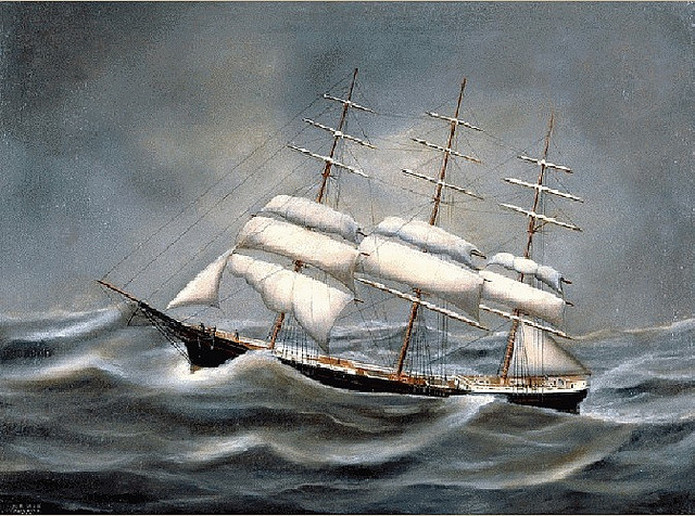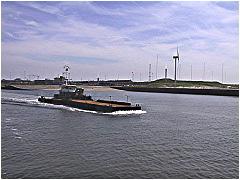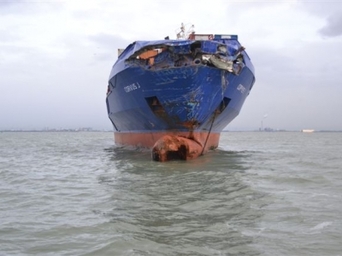
Isn't Banquo's ghost a little like the role played by the U.S. Merchant Marine, as our nation talks about budget and priorities? You wouldn't want to take the parallel too far; but with regard to our invisibility at the national table, I'd say we bear an uncomfortable resemblance to the famous ghost.
As a career American merchant mariner, this "broadcast" on Maritime TV caught my eye. It's an interview with Denise Krepp, former MARAD Chief Counsel, and Tony Munoz, Editor of Maritime Executive magazine. Both have written articles recently about actions the U.S. government has taken - and failed to take - that they maintain have not only weakened the U.S. Merchant Marine, but may actually threaten its existence.
In Tony Munoz's editorial, Administration to Dismantle U.S. Merchant Marine? he criticizes the Administration's plan to change the U.S. food aid to starving countries scheme: first cutting, and now possibly eliminating, participation by the U.S. merchant fleet.
A few months ago the Administration slashed cargo preferences (the percentage of the cargo that would go in American ships) from 75% to 50%. Now, as part of its deficit-reduction plan, the White House wants to stop sending food shipments, period. Instead, the food aid to starving nations will be sent in the form of cash, partly to NGO (Non-Governmental Organization) outfits like OXFAM America, who will oversee distribution of the money and the purchasing of food in the countries of need.
I'm no expert in overseas relief, but in the past large numbers of dollars pumped into poorly-governed areas have had a way of slipping through the cracks, leaking away through obscure, sometimes invisible channels. Would cash-based aid feed people more efficiently, or just add to the corruption rife in many of these areas? I don't know - but whatever the answer to that question, this action represents a damaging blow to the U.S. Merchant Marine.
Tony also details several other actions that effectually weaken the domestic maritime industry, including this Administration's paltry allocation of stimulus funds or other support to maritime initiatives such as dredging ports in preparation for the larger Panama Canal, and Short Sea Shipping. I think he makes some good points.
Denise Krepp's article is headlined The End of the U.S. Merchant Marine? and baldly predicts that "The U.S. Merchant Marine fleet will be dead in ten years."
She lays out a persuasive argument comprising political indifference, the almost non-existent presence of the domestic maritime industry in the national debate about spending decisions, and the dire consequences to American readiness that result.
Both articles, as well as the Maritime TV page, recommend action and point American sailors to resources for raising these crucial questions with their representatives. This is an issue that cuts across both political parties and all branches of government, so there's no easy Good Guy or Bad Guy in this fight. It's basically our maritime industry - you and me - vs. indifferent lawmakers and a clueless public. And it won't be resolved favorably unless our voices are raised, and the public & politicians are made aware of the stakes.
Do you work in the U.S. maritime industry? Then you've got a dog in this fight - and you'd better get busy! Speak out strongly yourself, and educate and motivate others. Find your Representative here, but don't stop there - call or email your Senators, the White House, and even your local officials - they all need to know that their constituents regard this as important. If they know that, they will act - but if not, they'll regard the issue as disposable. We are not disposable!

So while you're calling and emailing, get onto your lawmakers about supporting WAVE 4. Not only is repairing waterways infrastructure good for everyone in the country - but successfully passing WAVE 4 will focus more attention on the entire U.S. Merchant Marine and its role in our national life & our national security.
Use the links above and your telephone to raise your voice - against harmful measures, and for good ones - so that Banquo's ghost can be heard by the whole table. And comment to let us know of other things we all can do.
We may all be ghosts if we don't speak up!


 RSS Feed
RSS Feed